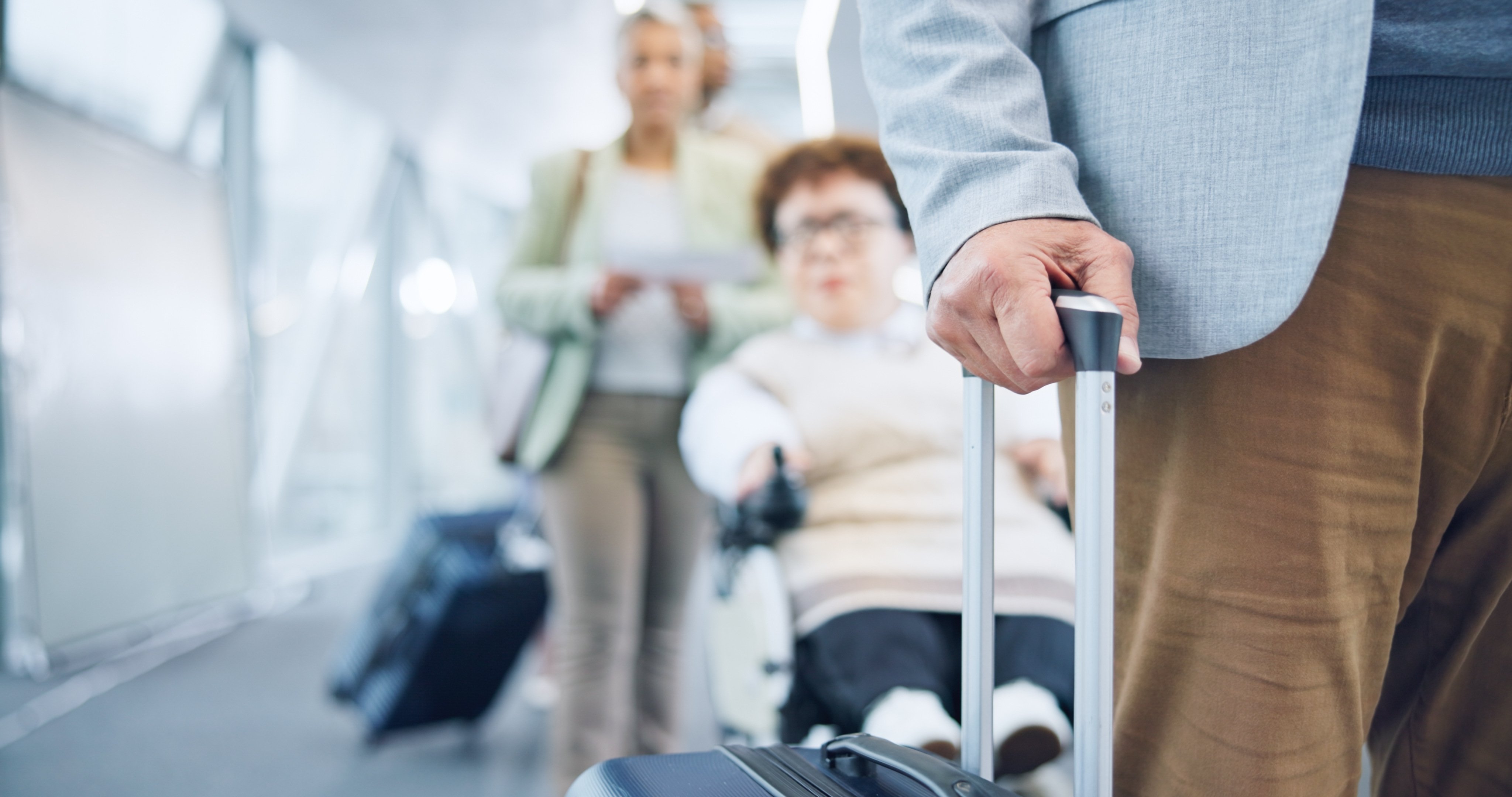While few people enjoy the stress of getting to the airport on time, enduring all the potential mishaps of security checks, turbulence, and ear-popping pain, these are actually some of the least concerning parts of the process for people in wheelchairs or scooters. One passenger of a Spirit Airlines flight carefully documented every step of the process when the major airline lost their wheelchair, spending over 40 hours trying to track it down- and this is one of the few stories that ends up with a returned wheelchair. This is the happy version of events for many passengers on flights.
The Department of Transportation (DOT) is proposing stronger rules for the Air Carrier Access act which addresses the ever-present problems anyone with a mobility device has faced in a major airline. You can comment publicly on this proposal, but comments have a deadline: less than one month from today, May 13. While you can read the full proposal any time, we broke down some of the legal jargon in the interest of time and energy. It's still a long read though, so if you want to skip to the end, we don't blame you.
Purpose and Authority
People who rely on mobility devices to fly can experience loss of time, wages, dignity, opportunities, and even suffer serious injuries when trusting an airline with the safe transfer of their wheelchair, scooter, or in some cases their whole body. The purpose of this proposal is to hold airlines more accountable for not only making up for their mishandling of wheelchairs and scooters, but also try to ensure the mishandling never occurs in the first place by issuing federally-enforced consequences for their actions, and mandating the specialized training of employees to support a better foundation for wheelchair handling.
There are already laws in place according to the Air Carrier Access Act, established in 1986, which "required carriers to provide nondiscriminatory service to individuals with disabilities. 55 FR 8008 (Mar. 6, 1990)." This gave the DOT permission to update the regulations as needed to ensure this nondiscriminatory service continued. However, we have seen firsthand that just because a law exists doesn't mean it's followed; thus this new proposal to tighten things up.
Proposed Changes and Definitions
1. "Safe and Dignified Assistance"
This one is exactly what it says: "Clarifies that safe and dignified assistance to individuals with disabilities is required when providing required accommodations."
2. "Prompt Enplaning, Deplaning, and Connecting Assistance"
This statement basically says that if someone needs help getting on or off a plane, or moving around the airport, they should get it quickly. The speed of help depends on the situation. If someone needs help getting off the plane, the airport should have staff and a wheelchair ready as soon as all the other passengers have left. And if the person has their own wheelchair, it should be brought as close to the plane's door as possible, unless there are safety rules against it or the person asks for it to be somewhere else. If they do ask for it to be somewhere else, the airport should provide another wheelchair for them to use.
3. "Mishandling of Wheelchairs and Assistive Devices as Per Se Violation"
This says that if an airline loses, delays, damages, or steals someone's wheelchair or assistive device, it's automatically considered a violation of the rules, and the airline can face penalties. If this happens, the airline must tell the affected passenger right away about their rights. These rights include: making a claim with the airline, getting a temporary wheelchair from the airline with specific adjustments, picking their own repair shop if they want, and having access to a Complaints Resolution Official and information on how to contact them.
4. "Passenger Notifications After Wheelchair Is Loaded on and Unloaded from Aircraft"
Again, this one just gets a direct quote because it's easy to understand: "Requires airlines to timely notify passengers when their wheelchairs or scooters have been loaded to and unloaded from the cargo compartment of their flights. Requires airlines to notify passengers immediately upon learning that the passenger's wheelchair or scooter does not fit on the plane."
5. "Prompt Return of Delayed Wheelchairs or Scooters"
This rule says that if an airline can't get a passenger's wheelchair or scooter to them when they arrive, they have to do it within 24 hours, no matter what it takes. The passenger gets to decide if they want to pick it up at the airport or have it delivered somewhere else, like their home or hotel. The airline has to consider the wheelchair or scooter as given to the passenger either when it's delivered to the requested location or when it's ready for pickup at the airport and the passenger has been told where to get it.
6. "Prompt Repair or Replacement of Damaged Wheelchairs or Scooters"
This rule says that if an airline messes up and damages or loses someone's wheelchair or assistive device, the passenger gets to choose how it's fixed or replaced. They can either let the airline handle it, getting a similar or better device within a reasonable time and at no extra cost, or they can arrange for the repair or replacement themselves through their chosen repair shop, with the airline responsible for transporting the device to the shop and paying for the repairs directly.
7. "Loaner Wheelchair Accommodations"
"Requires airlines to provide loaner wheelchairs while individuals with disabilities are waiting on repairs or replacement of a mishandled device. Requires airlines to consult with the individual receiving the loaner wheelchair to ensure that the loaner wheelchair fits the passenger's functional needs, as much as possible, and safety-related needs."
8. "Enhanced Training for Certain Airline Personnel and Contractors"
"Requires annual training, including hands-on training, of airline employees and contractors who physically assist passengers with mobility disabilities or handle passengers' wheelchairs or scooters."
9. "New Improved Standards for On-Board Wheelchairs (OBW)"
"Requires new improved performance standards for OBWs on twin-aisle aircraft and aircraft with 60 or more seats, consistent with standards for OBWs on single-aisle aircraft with 125 or more seats."
10. "Size Standard for Lavatories on Twin-Aisle Aircraft"
Now this one is tricky. This proposal asks for feedback on whether to require one lavatory on airplanes to be big enough for both a passenger with a disability and an attendant to get in and move around comfortably. It also suggests using a specific size standard based on the 95th percentile male, instead of the current vague standard, especially for lavatories on twin-aisle aircraft.
(Note: If you don't know what "95th percentile male" means: it's basically a survey of civilians which gets fed into existing military data, and it's used to define "average" sizes sometimes. In this database, a 95th percentile male is 6 feet, 2 inches and 246 pounds.)
11. "Reimbursement of Fare Difference"
This one is another gentle suggestion for comment instead of an outright proposal of law. It asks whether "U.S. and foreign air carriers should be required to reimburse the difference between the fare on a flight a wheelchair user took and the fare on a flight that the wheelchair or scooter user would have taken if his or her wheelchair or scooter had been able to fit in the cabin or cargo compartment of the aircraft."
The Cost
We all know money makes the world go round- so how much is this going to cost? It sounds almost too good to be plausible- but the fascinating thing is, it's actually super affordable to be accessible when it comes to major airlines and maybe just NOT mishandling important equipment.
| Subject | Costs | Benefits |
|---|---|---|
| Safe, Dignified, and Prompt Assistance | $0 | $0 |
| Mishandling of Wheelchairs and Assistive Devices as Per Se Violation | $0 | $0 |
| Passenger Notifications; Return, Repair, and Replacement of Wheelchairs and Scooters; and Loaner Wheelchair Accommodations | $0 | $0 |
| Enhanced Training for Certain Airline Personnel and Contractors | $5.44 million | $6.0 million |
| New Improved Standards for On-Board Wheelchairs (OBWs) | $700,000 | $0 |
| Total | $6.1 million | $6.0. million |
The current analysis shows that the benefits of this rulemaking might be slightly less than the costs when only quantifiable factors are considered. However, the Department believes that once you include all the benefits, not just the ones you can measure, the benefits would outweigh the costs.
Some of the unmeasured benefits include:
- Reduced injuries: This rule could lead to fewer injuries, including fatalities, for people with disabilities who receive physical assistance from airline staff. It could also reduce injuries to airline personnel and contractors.
- Lower repair costs: By providing better training for handling wheelchairs, the rule could prevent damage to wheelchairs, resulting in lower repair costs.
- Improved dignity and mobility: People with disabilities may experience improved dignity and mobility due to fewer mishandlings of wheelchairs and better accommodations for loaner wheelchairs.
- Reduced wait times: Passengers may have to wait less time for their mishandled wheelchairs to be returned to them.
- Enhanced bathroom accessibility: The proposal may improve accessibility in aircraft bathrooms, which could benefit passengers with disabilities.
- Restored confidence in flying: This rulemaking might help individuals with disabilities feel more confident about flying, which could have significant benefits for them and for the airline industry as a whole.
Why do we need this proposal right now?
This is the section called "Need for a Rulemaking" and outlines the reasons this is happening.
Disability rights advocates have raised concerns about the poor assistance those with mobility impairments receive from airlines, focusing on delayed or damaged personal wheelchairs, unsafe transfers between wheelchairs and aircraft seats, and a lack of prompt wheelchair assistance at airports. These concerns are backed by incidents resulting in injuries like fractures and improper use of aisle chairs, which can cause passengers to bump into armrests or even be dropped during transfers. Mishandled wheelchairs not only impact mobility but also health and independence, as wheelchairs can be custom-fitted and delays can lead to injuries like pressure sores. The Department's Public Meeting on Air Travel by Persons Who Use Wheelchairs in March 2022 highlighted these issues, with individuals sharing stories of significant delays, damages, and the negative effects of unsafe transfers. While airlines claim to be making efforts to accommodate passengers with disabilities, advocates stress the need for more comprehensive actions because nothing is changing.
Despite mandatory monthly reporting of mishandled wheelchair and scooter data, the number of mishandled devices remains stubbornly high, mirroring levels observed in the first year this reporting was implemented, 2019. The mishandling rate of wheelchairs and scooters surpasses that of checked bags. In particular, inadequate wheelchair assistance, which includes delayed aid and unsafe physical assistance, is the most common grievance, making up over 40% of all disability-related complaints filed with the Department from 2013 to 2022. Similarly, over 46% of disability-related complaints received directly by U.S. and foreign air carriers relate to inadequate wheelchair assistance during the same period. Complaints regarding mishandled assistive devices, such as delayed or damaged wheelchairs and scooters, make up more than 13% of all disability-related complaints. Despite efforts to address these issues, the data shows persistent challenges in ensuring the safe and timely transport of mobility aids, with more than one in every 100 wheelchairs and scooters transported in the cargo compartments of domestic flights being mishandled.
The document is much longer than I have time to read and translate, and goes into more detail, like what specific questions need to be asked (example, "Are the terms “safe” and “dignified” easily understood by carriers and by the public?" so we're starting off small here, I guess.) However, you don't need to read the whole proposal to comment! You are an expert in your own experiences with disability, and that's all you need to use your voice and make an impact.
How do I comment?
Comment anonymously, as an organization, or represent just yourself by clicking here and finding the blue "Comment" button.
Do also let us know on social media if you left a comment!

.jpg)


